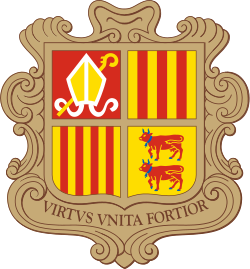Campaign
Five parties contested the election: The governing Social Democrats (PS), the newly formed opposition Democrats for Andorra (DA), the third place Andorra for Change (ApC), the Greens and the local conservative Lauredian Union (LU) party.
Out of these only the PS, DA and LU contested the parish seats. The PS contested all parishes, while DA contested all but Sant Julià de Lòria, which was contested by Lauredian Union. ApC announced they would support DA candidates on a parish level. [8] The Liberal Party of Andorra, which finished in second place with 11 seats in the prior elections, did not contest.
Incumbent Prime Minister Jaume Bartumeu and his main challenger Antoni Martí wanted to change the protectionism previously prevalent in the national economy. They sought to attract foreign capital primarily in the technology sector to diversify from a current economy based on trade (33%), tourism (33%) and banking (17%). Due to the 2008 financial crisis and its effect on Spain, which accounts for 80% of Andorran trade, (the other 20% with France) the economy was in a "severe crisis." Since 2008, 4,000 people [2] in the country of 84,525 [9] (almost 5% of the total population) lost their jobs, including seasonal employment.
Bartumeu had released the listing of Andorra's tax haven status with the Organisation for Economic Co-operation and Development. He also enacted a law to lift bank secrecy. He accuses right-winged parties of not forgiving him for a "move towards transparency and fiscal reforms."
Martí said that: "We develop our tax system to be within the European standards, Andorrans do not want to pay taxes, but they understand the need to change the system. We will keep an attractive tax regime and will continue to offer attractive products." Still there was some "broad consensus on economic and tax issues" between the two main parties; though the main difference was the creation of an income tax. Bartumeu sought to tax incomes of more than 40,000 euros, even though the minimum wage is 39,600. Marti opposed the entire proposal.
Eusebi Nomen of Andorra for Change also denounced the proposed increased tax burden and accused the government of selling "national sovereignty."
The Greens of Andorra's Isabel Lozano said that economic development must be more environmentally friendly. [2]
Results
The Democrats for Andorra won a landslide victory, taking every parish in which they stood and winning the national vote, giving them 20 out of the 28 General Council's seats, the biggest victory in the country's history. [10] The Social Democrats lost all their parish seats and held only their six national seats, while Lauredian Union returned to the General Council, winning the parish of Sant Julià de Lòria. Andorra for Change lost all their seats, and the Greens finished last, gaining no seats. [11] [12]
Voter turnout was 74.14%. [3] Of the 28 members elected, 14 were women, making 50% of the parliament legislators women (up from 32%). [13] [14] This made Andorra the first European country to reach gender parity in parliament.
| Party | PR | Constituency | Total
seats |
|---|
| Votes | % | Seats | Votes | % | Seats |
|---|
| Democrats for Andorra [a] | 8,553 | 55.15 | 8 | 7,723 | 51.58 | 12 | 20 |
| Lauredian Union | – | 1,349 | 9.01 | 2 | 2 |
| Social Democratic Party [b] | 5,397 | 34.80 | 6 | 5,901 | 39.41 | 0 | 6 |
| Andorra for Change | 1,040 | 6.71 | 0 | 0 |
| Greens of Andorra | 520 | 3.35 | 0 | 0 |
| Total | 15,510 | 100.00 | 14 | 14,973 | 100.00 | 14 | 28 |
|
| Valid votes | 15,510 | 95.76 | | 14,973 | 92.51 | | |
|---|
| Invalid/blank votes | 687 | 4.24 | | 1,212 | 7.49 | | |
|---|
| Total votes | 16,197 | 100.00 | | 16,185 | 100.00 | | |
|---|
| Registered voters/turnout | 21,852 | 74.12 | | 21,852 | 74.07 | | |
|---|
| Source: Andorra Elections |
Parish lists
- Canillo
- Encamp
- Ordino
- La Massana
- Andorra la Vella
- Sant Julià de Lòria
- Escaldes-Engordany
This page is based on this
Wikipedia article Text is available under the
CC BY-SA 4.0 license; additional terms may apply.
Images, videos and audio are available under their respective licenses.

